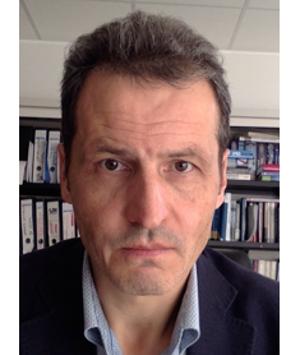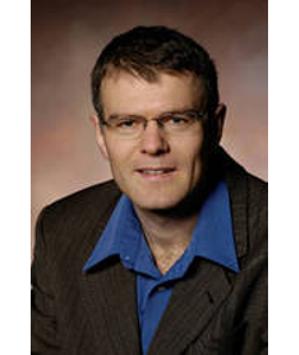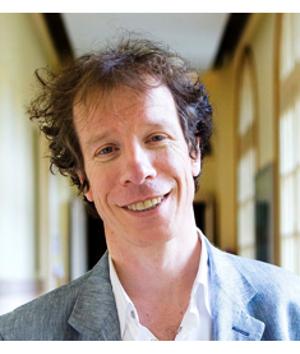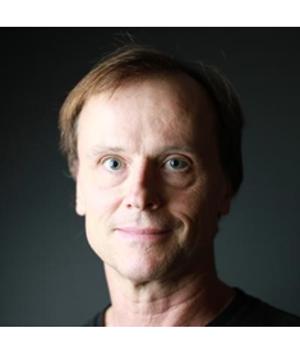
|
Coalitional Multimedia Signal Processing in Smart Device NetworksSeptember 4, 2018, Auditorium, 9:30 - 10:30 Prof. Marc MoonenKU Leuven, Department of Electrical Engineering, Stadius Center for Dynamical Systems, Signal Processing and Data Analytics, Belgium |
Abstract
Digital signal processing (DSP) is a key enabler of the development of future communication networks and in particular of the Internet of Things (IoT). On the other hand, the communication between electronic devices made available in the IoT may become an enabler for significant performance improvement in the DSP functionalities of individual devices. By cooperating with other devices, each individual device may seek to improve its own DSP performance, beyond 'stand-alone' performance, even when other devices perform different DSP tasks. Managing cooperation in a 'coalition' of devices with different DSP tasks first requires a solid understanding of the opportunities for cooperation as well as of the achievable performance gains. Secondly, centralized and distributed 'coalitional' signal processing algorithms have to be developed, including signal fusion, topology selection and resource allocation procedures. General ideas and algorithms will be discussed as well as illustrated by means of applications in the speech & audio signal processing context.
Bio
Marc Moonen is a full professor at the Department of Electrical Engineering, KU Leuven, Belgium, where he is heading a research team working in the area of numerical algorithms and signal processing for digital communications, wireline communications, and speech & audio signal processing. He received the PhD degree in applied sciences from KU Leuven in 1990. He was chairman of the IEEE Benelux Signal Processing Chapter (1998-2002) and president of EURASIP (2007-2008 and 2011-2012). He has served as editor-in-chief for the EURASIP Journal on Applied Signal Processing (2003-2005) and area editor for feature articles in the IEEE Signal Processing Magazine (2012-2014). Since 2013 he is heading the Stadius Center for Dynamical Systems, Signal Processing and Data Analytics (www.esat.kuleuven.be/stadius). He is a fellow of the IEEE (2007) and a fellow of EURASIP (2018).

|
Synthetic Molecular Communication: Fundamentals, Opportunities, and ChallengesSeptember 5, 2018, Auditorium, 9:00 - 10:00 Prof. Robert SchoberFriedrich-Alexander University Erlangen-Nuremberg (FAU), Germany |
Abstract
Synthetic molecular communication is an emerging research area offering many interesting and challenging new research problems for engineers, biologists, chemists, and physicists. Synthetic molecular communication is widely considered to be an attractive option for communication between nano-devices such as (possibly artificial) cells and nano-sensors. Possible applications of nano-communication networks include targeted drug delivery, health monitoring, environmental monitoring, and "bottom-up" manufacturing. The IEEE and ACM have recently founded several new conferences and journals dedicated to this exciting new and fast growing research area. In this keynote, we will give first a general overview of the areas of synthetic molecular communication and nano-networking. Components of synthetic molecular communication networks, possible applications, and the evolution of the field will be reviewed. We will focus particularly on diffusion based synthetic molecular communication, identify the relevant basic laws of physics and discuss their implications for communication system design. Subsequently, several communication engineering design and signal processing problems will be discussed, including detection, channel estimation, parameter estimation, and synchronization. Furthermore, some experimental results will be provided. In the last part of the talk, we will discuss some research challenges in synthetic molecular communication.
Bio
Robert Schober was a Professor and Canada Research Chair at the University of British Columbia (UBC), Vancouver, Canada, from 2002 to 2011. Since January 2012 he is an Alexander von Humboldt Professor and the Chair for Digital Communication at Friedrich-Alexander University Erlangen-Nuremberg (FAU), Germany. His research interests fall into the broad areas of Communication Theory, Wireless Communications, and Statistical Signal Processing. Robert received several awards for his work including the 2007 Wilhelm Friedrich Bessel Research Award of the Alexander von Humboldt Foundation, the 2008 Charles McDowell Award for Excellence in Research from UBC, a 2011 Alexander von Humboldt Professorship, a 2012 NSERC E.W.R. Stacie Fellowship, and the 2017 Wireless Communication Technical Committee Recognition Award. In addition, he has received several best paper awards for his research and is listed as a 2017 Highly Cited Researcher by the Web of Science. Robert is a Fellow of the Canadian Academy of Engineering,a Fellow of the Engineering Institute of Canada, and a Fellow of the IEEE. From 2012 to 2015, he served as Editor-in-Chief of the IEEE Transactions on Communications. Currently, he is the Chair of the Steering Committee of the IEEE Transactions on Molecular, Biological and Multiscale Communication and serves on the Editorial Board of the Proceedings of the IEEE. Furthermore, he is a Member at Large of the Board of Governors and a Distinguished Lecturer of the IEEE Communications Society.

|
Deep Convolutional Networks: An Opportunity for Signal ProcessingSeptember 6, 2018, Auditorium, 9:00 - 10:00 Prof. Stéphane MallatCollège de France, France |
Abstract
Deep convolutional network have obtained spectacular results in machine learning to solve complex classification and regression tasks. They are now also used to synthesize images and audio signals with Generative Adversarial Networks and recurrent networks, to suppress noise and solve inverse problems. They are thus also invading the signal processing arena. Deep convolutional networks are based on filter banks or recursive filters, which are no stranger to signal processing, but they involve complex cascade of non-linearities, with optimization algorithms which are not understood. It brings new air and problems to signal processing and information theory, which is an opportunity for signal processing research. I will explain how deep neural networks relate to classic signal processing tools including wavelets, compression and sparse inverse problems, and discuss challenging open problems for image and audio processing.
Bio
Stéphane Mallat received the Ph.D. degree in electrical engineering from the University of Pennsylvania, in 1988. He was then Professor at the Courant Institute of Mathematical Sciences, until 1994. In 1995, he became Professor in Applied Mathematics at Ecole Polytechnique, Paris and Department Chair in 2001. From 2001 to 2007 he was co-founder and CEO of a semiconductor start-up company. From 2012 to 2017 he was Professor in the Computer Science Department of Ecole Normale Supérieure, in Paris. Since 2017, he holds the "Data Sciences" chair at the Collège de France. Stéphane Mallat's research interests include machine learning, signal processing, and harmonic analysis. He is a member of the French Academy of sciences, a foreign member of the US National Academy of Engineering, an IEEE Fellow and an EUSIPCO Fellow. In 1997, he received the Outstanding Achievement Award from the SPIE Society and was a plenary lecturer at the International Congress of Mathematicians in 1998. He also received the 2004 European IST Grand prize, the 2004 INIST-CNRS prize for most cited French researcher in engineering and computer science, the 2007 EADS grand prize of the French Academy of Sciences, the 2013 Innovation medal of the CNRS, and the 2015 IEEE Signal Processing best sustaining paper award.

|
Sensing and Processing with EventsSeptember 7, 2018, Auditorium, 9:00 - 10:00 Prof. Tobi DelbruckUniversity of Zurich and ETH Zurich, Switzerland |
Abstract
Conventional machine vision and audition faces a fundamental latency-power tradeoff, where decreasing latency means increasing sensor sample rate and therefore power consumption. The communication by spikes in the brain provides the inspiration for our developments of event-based vision and audio sensors and processing, which avoids this latency-power tradeoff. This talk will provide a personal perspective on developments of event-based vision and audio sensors, algorithms, and applications. It will include a demonstration of a recent vision sensor. There are many opportunities for novel signal processing and machine learning approaches using these asynchronous sensors.
Bio
Tobi Delbruck (IEEE M'99-SM'06-F'13) received a Ph.D. degree from Caltech in 1993. He is currently a professor of physics and electrical engineering at ETH Zurich in the Institute of Neuroinformatics, University of Zurich and ETH Zurich, Switzerland, where he has been since 1998. His group, which he coordinates together with Dr. Shih-Chii Liu, focuses on neuromorphic event-based sensors and sensory processing. He has co-organized the Telluride Neuromorphic Cognition Engineering summer workshop and the live demonstration sessions at ISCAS and NIPS. Delbruck is past Chair of the IEEE CAS Sensory Systems Technical Committee. He worked on electronic imaging at Arithmos, Synaptics, National Semiconductor, and Foveon and has founded 3 spin-off companies, includinginilabs.com, a community-oriented organization that has distributed R&D prototype neuromorphic sensors to more than a hundred organizations around the world. He has been awarded 9 IEEE awards.
